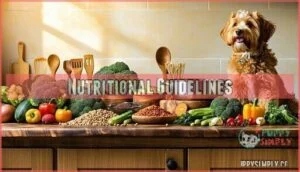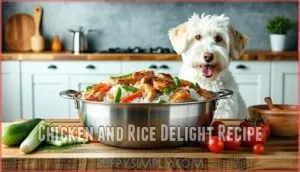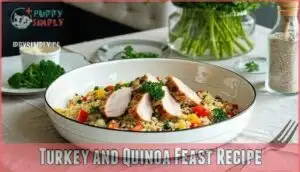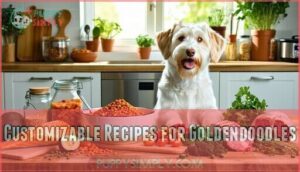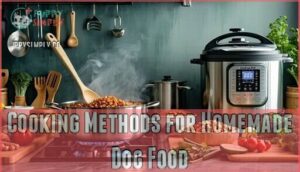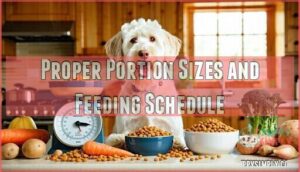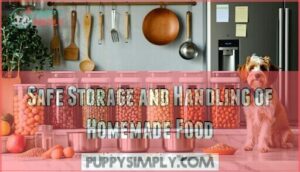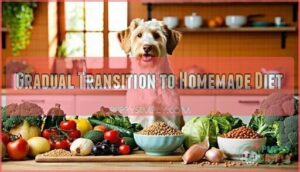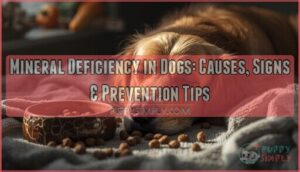This site is supported by our readers. We may earn a commission, at no cost to you, if you purchase through links.

Mix 50% protein, 25% vegetables, and 25% grains, calculating portions at 2-3% of their ideal body weight daily. Essential recipes include beef with sweet potato, chicken with quinoa, or turkey with green beans.
Cook thoroughly, store refrigerated for up to seven days, and switch gradually over 7-10 days to prevent digestive upset. The secret lies in balancing nutrients while avoiding toxic ingredients like onions and chocolate.
Table Of Contents
- Key Takeaways
- Benefits of Homemade Food
- Nutritional Guidelines
- Homemade Dog Food Recipes
- Preparation and Storage Tips
- Common Mistakes to Avoid
- Frequently Asked Questions (FAQs)
- What is the best food to feed a Goldendoodle?
- What do vets recommend for homemade dog food?
- What foods should goldendoodles avoid?
- What are most goldendoodles allergic to?
- Can puppies eat homemade dog food safely?
- How much does homemade food cost monthly?
- What kitchen equipment is needed for preparation?
- Can homemade food help with specific allergies?
- How long does meal prep take weekly?
- Can puppies eat the same homemade recipes?
- Conclusion
Key Takeaways
- You’ll gain complete control over ingredients by making homemade food, eliminating harmful preservatives, fillers, and chemicals while customizing meals for your Goldendoodle’s specific dietary needs and health conditions.
- You need to follow proper nutritional ratios of 50% protein, 25% vegetables, and 25% grains, calculating portions at 2-3% of your dog’s ideal body weight daily to ensure balanced nutrition.
- You must transition gradually over 7-10 days when switching to homemade food, starting with 25% homemade and 75% commercial food, then slowly increasing the homemade portion to prevent digestive upset.
- You should consult your veterinarian before starting since 95% of homemade diets lack proper nutrient balance, and professional guidance helps prevent dangerous deficiencies while ensuring your recipes meet your Goldendoodle’s specific needs.
Benefits of Homemade Food
Making homemade food for your Goldendoodle gives you complete control over every ingredient that goes into their bowl.
Take full control of your Goldendoodle’s nutrition with fresh, homemade ingredients you can trust.
You’ll eliminate harmful preservatives, fillers, and chemicals while customizing meals to meet your dog’s specific dietary needs and health conditions, allowing for a more personalized approach to their health.
Promoting Healthy Eating Habits
When you choose homemade dog food for your Goldendoodle, you’re taking control of their nutrition journey.
This mindful dog-feeding approach helps establish healthy patterns that benefit your pet’s long-term wellbeing.
Consider these key advantages:
- Scheduled mealtimes create routine and improve digestion
- Portion control prevents overeating and maintains ideal weight
- Activity-based diet adjustments match your Goldendoodle’s energy needs
Hydration importance becomes clearer with fresh ingredients, while goldendoodle nutrition improves through consistent, quality meals that support peak goldendoodle health.
Quality Control Over Ingredients
When you make homemade dog food for your Goldendoodle, you control every ingredient that goes into their bowl. You can choose fresh ingredients from trusted sources, ensuring food safety and contamination prevention.
This ingredient sourcing approach lets you avoid mystery additives and fillers found in commercial options. With natural dog food preparation, you’re the quality inspector, selecting only the best dog food ingredients for your furry friend’s goldendoodle nutrition needs.
By following proper homemade food guidelines, you can create a well-balanced diet for your pet.
Customization Based on Dietary Needs
Every Goldendoodle has unique dietary requirements, and homemade food lets you tailor meals perfectly.
You can address dog food allergies by eliminating problem ingredients, create senior diets with softer textures, or develop puppy needs with higher protein.
Weight management becomes simple when you control portions, while allergy management targets specific ailments through customized Goldendoodle diet recipes, allowing for effective weight management and overall health improvement with the right dietary requirements.
Avoiding Harmful Preservatives and Fillers
When you prepare homemade dog food for your Goldendoodle, you’re ditching commercial products loaded with toxic substances and harmful food additives.
Homemade food eliminates mystery additives that commercial brands hide in your dog’s bowl
Natural ingredients in your chemical-free recipes eliminate preservatives and fillers that can trigger allergies or digestive issues.
Your organic diet approach gives you complete control over what goes into your pup’s bowl, ensuring only wholesome, natural dog food reaches their system.
By considering dietary supplement options, you can further enhance your dog’s nutrition and overall health.
Nutritional Guidelines
Understanding proper nutrition is essential when you prepare homemade meals for your Goldendoodle. You’ll need to balance proteins, carbohydrates, fats, vitamins, and minerals to keep your dog healthy and thriving.
Essential Proteins for Goldendoodles
When you’re choosing protein sources for your Goldendoodle, quality matters.
Lean meats, eggs, and organ meats all support muscle growth and immune health.
Here are four smart picks:
- Meat Options: Chicken and brown rice, turkey and quinoa
- Fish Oil: Adds omega-3s
- Egg Benefits: Complete protein
- Organ Meats: Packed with vitamins and minerals
Importance of Carbohydrates and Fats
Carbohydrates supply 30-60% of your Goldendoodle’s energy needs through wholesome grains like brown rice and sweet potatoes.
These carb sources aid digestion while providing essential fiber.
Fats deliver 40-50% of caloric requirements, supporting coat health and nutrient absorption.
Balanced fat intake from lean meats and oils guarantees proper energy levels and maintains healthy nutrient balance for active breeds, ensuring a healthy nutrient balance.
Crucial Vitamins and Minerals
Your Goldendoodle needs specific vitamins and minerals for peak health.
Vitamin A supports vision and immune function, while Vitamin D strengthens bones.
Vitamin E protects cells from damage.
Calcium needs must balance with phosphorus at a 1.2:1 ratio.
Iron prevents anemia, and omega-3 fatty acids promote healthy skin.
Proper mineral balance and nutrient ratios prevent deficiencies in homemade diets, ensuring your Goldendoodle receives the necessary nutrients for optimal health, including Vitamin A and Vitamin D.
Balanced Diet for Optimal Health
Creating a balanced diet for ideal health means combining all nutrients in the right proportions.
Your goldendoodle’s dietary needs include proper nutrient balance for healthy digestion and complete nutrition.
Effective meal planning guarantees your homemade dog food provides complete canine nutrition.
A well-structured goldendoodle diet with balanced ratios supports overall wellness and prevents deficiencies, ensuring a diet that is well-structured.
Homemade Dog Food Recipes
You’ll find these five proven recipes perfect for creating nutritious, balanced meals your Goldendoodle will love.
Each recipe combines high-quality proteins with wholesome carbohydrates and essential nutrients to support your dog’s health and energy levels.
Beef Delight Dinner Recipe
Your Goldendoodle will love this protein-packed Beef Delight Dinner that combines ground beef, brown rice, butternut squash, and green beans.
Mix one cup cooked ground beef with two cups brown rice, half cup diced butternut squash, and quarter cup green beans.
This beef and sweet potato variation provides excellent beef nutrition while supporting your goldendoodle diet through careful meal planning and proper dinner prep following food safety guidelines.
Chicken and Rice Delight Recipe
This comforting chicken and rice combination provides your Goldendoodle with easily digestible protein and gentle carbohydrates. You’ll create a nutritious meal that supports healthy digestion while delivering balanced nutrition your pup will love.
- Chicken Nutrition delivers high-quality protein for muscle development and immune support
- Rice Benefits include easy digestion and steady energy release for active dogs
- Food Safety requires proper cooking temperatures and fresh ingredient handling for maximum Nutrient Balance
To guarantee a well-balanced diet, consider the importance of proper nutrition guidelines when preparing homemade dog food.
Turkey and Quinoa Feast Recipe
Turkey provides lean protein while quinoa delivers complete amino acids for your Goldendoodle’s muscle development.
This recipe helps manage dog allergies since both ingredients are gentle on sensitive stomachs. You’ll appreciate the simple feast preparation that supports effective meal planning.
| Ingredient | Amount |
|---|---|
| Ground turkey | 1 cup |
| Cooked quinoa | 2 cups |
| Mixed vegetables | 1/2 cup |
| Flaxseed oil | 1 tablespoon |
Cook turkey thoroughly, mix with quinoa and vegetables, then add oil before serving.
Customizable Recipes for Goldendoodles
Beyond the core recipes you’ve explored, you can master homemade dog food recipes with endless customization options for your Goldendoodle’s unique needs.
Recipe variations help address food allergies by rotating proteins like fish or lamb.
Diet planning becomes simple when you adjust portions based on activity level, and meal prep flexibility lets you batch-cook customizable dog food weekly.
Creating homemade canine cuisine that supports ideal Goldendoodle nutrition is the ultimate goal, with customizable dog food being a key factor in achieving this.
Preparation and Storage Tips
Making homemade food successfully requires proper preparation techniques and storage methods to keep your Goldendoodle healthy.
You’ll need to master cooking methods, portion control, and safe handling practices to guarantee each meal provides wholesome nutrition.
Cooking Methods for Homemade Dog Food
You’ll find several effective cooking techniques for preparing homemade dog food recipes.
Stovetop cooking offers the most control over texture and doneness, while an Instant Pot speeds up meal prep substantially.
Food safety remains paramount with any cooking method. When preparing homemade dog food, using a dog food cooker can be beneficial for uniform heating.
Here are proven cooking techniques:
- Stovetop Cooking – Brown proteins first, then add vegetables and grains
- Instant Pot – Perfect for batch cooking large quantities quickly
- Slow Cooking – Ideal for tougher cuts of meat and busy schedules
- Raw Diet Preparation – Requires careful handling and immediate serving
Proper Portion Sizes and Feeding Schedule
Your Goldendoodle needs daily feeding based on their body weight—typically 2-3% of their ideal weight.
A 50-pound dog requires about 1-1.5 pounds of homemade dog food daily.
Split this into two meals for better nutrient balance and digestion.
Adjust portion control based on activity level and age for healthiest results.
To guarantee accurate measurements, consider using a dog food scale for precise portion control.
Safe Storage and Handling of Homemade Food
Proper storage keeps your homemade dog food fresh and safe. Raw ingredients spoil quickly, so you’ll want to follow these food safety practices to protect your Goldendoodle’s health.
- Refrigerate immediately – Store prepared meals in airtight containers for up to 5-7 days maximum
- Freeze for longer storage – Batch-prepared food stays fresh for 2-3 months when properly sealed
- Use clean utensils – Separate cutting boards and tools prevent cross-contamination during food preparation
- Label everything – Date containers so you know when meals were made and avoid spoiled food
- Thaw safely – Move frozen portions to the refrigerator overnight, never at room temperature
To achieve the best results, understanding proper nutrition guidelines is vital for your Goldendoodle’s diet.
Gradual Transition to Homemade Diet
Once you’ve mastered proper storage practices, switching your Goldendoodle to homemade dog food requires patience and planning.
A gradual switch over 7-10 days prevents digestive upset while allowing your dog’s system to adapt to new ingredients and textures. Understanding the dog food transition process is vital for a successful switch.
| Day | Commercial Food | Homemade Food |
|---|---|---|
| 1-2 | 75% | 25% |
| 3-4 | 50% | 50% |
| 5-6 | 25% | 75% |
| 7+ | 0% | 100% |
Monitor your dog’s appetite, energy levels, and stool quality throughout this process to verify they’re adjusting well to their new diet.
Common Mistakes to Avoid
While making homemade food for your Goldendoodle seems straightforward, several critical mistakes can harm your pet’s health.
Even well-intentioned dog owners often create nutritionally incomplete meals or accidentally include toxic ingredients that can lead to serious health problems, such as creating meals that are not complete.
Risks of Nutrient Deficiencies
While proper storage keeps your homemade meals fresh, nutritional deficiencies pose serious health risks.
Most homemade dog diets lack balanced nutrition, creating dangerous gaps in your Goldendoodle’s health.
Common nutritional deficiencies include:
- Protein deficiency – causes muscle wasting and decreased energy
- Calcium-phosphorus imbalance – leads to bone disorders and joint problems
- Vitamin deficiencies – affects vision, immune function, and neurological health
- Essential fatty acid shortage – results in poor coat and skin issues
- Trace mineral gaps – impacts thyroid function and cellular processes
These malnutrition effects develop slowly, making dietary errors hard to detect without veterinary guidance.
Dangers of Toxic Ingredients
Never underestimate the hidden dangers lurking in your kitchen.
Toxic foods like grapes, chocolate, and onions can trigger kidney failure, anemia, or fatal poisoning in your Goldendoodle.
Harmful additives such as xylitol and artificial preservatives pose serious health risks.
Always research ingredients thoroughly before adding them to homemade meals.
Importance of Veterinary Consultation
Veterinary consultation isn’t just smart—it’s essential for your Goldendoodle’s health.
Without professional veterinary guidance, you’re gambling with your dog’s nutrition. Dogs fed without vet consultation are 60% more likely to develop dangerous imbalances.
- Nutrition Planning: Customized protein, fat, and mineral ratios prevent deficiencies
- Health Monitoring: Early detection of allergies and dietary triggers
- Diet Transition: Professional oversight reduces digestive upset risks
- Consultation Benefits: 68% report improved coat and energy with vet-approved plans
Regular check-ups help identify and manage common pet issues to guarantee overall well-being, and help make certain your dog receives the best care by providing a personalized approach to their dietary needs.
Avoiding Over-Supplementation and Imbalances
Over-supplementation creates a nutritional tightrope walk that can topple your Goldendoodle’s health faster than you’d think.
Excess supplements can harm your dog faster than deficiencies can develop
Too much of a good thing can poison your pup’s health.
Too many dietary supplements disrupt nutrient absorption and canine nutritional balance.
Monitor your dog’s health closely when switching to homemade dog food, watching for signs of dietary errors in your balanced recipes.
| Supplement Type | Risk of Excess | Signs to Watch |
|---|---|---|
| Calcium | Bone development issues | Joint stiffness, growth problems |
| Vitamin A | Liver toxicity | Lethargy, appetite loss |
| Iron | Organ damage | Vomiting, dark stools |
| Vitamin D | Kidney problems | Excessive thirst, weakness |
Frequently Asked Questions (FAQs)
What is the best food to feed a Goldendoodle?
High-quality commercial dog food or properly balanced homemade meals work best for Goldendoodles.
You’ll want recipes with lean protein, healthy carbs, and vegetables – but consult your vet first to confirm nutritional completeness of lean protein.
What do vets recommend for homemade dog food?
Crafting your pup’s meals is like building a house—you need a solid foundation. Vets emphasize proper nutrient balance, gradual switches, and professional consultation to prevent dangerous deficiencies that affect 95% of homemade diets.
What foods should goldendoodles avoid?
Goldendoodles should avoid chocolate, onions, garlic, grapes, raisins, and xylitol-containing foods. These can cause serious poisoning.
Also skip avocados, macadamia nuts, and foods high in fat or sodium for their safety.
What are most goldendoodles allergic to?
Roughly 10% of dogs develop food allergies, with chicken being the top culprit. Your goldendoodle’s most likely allergic to chicken, beef, dairy, wheat, and soy, though environmental triggers like mold and pollen cause more reactions overall.
To manage these allergies, this is key to understanding common food allergens that can affect your dog’s health.
Can puppies eat homemade dog food safely?
Yes, puppies can eat homemade food, but it’s trickier than feeding adults.
Growing pups need precise nutrition for proper development.
You’ll want your vet’s guidance to guarantee balanced meals that support healthy growth and avoid deficiencies.
How much does homemade food cost monthly?
Monthly costs for homemade meals typically range from $50-150, depending on your dog’s size and ingredient choices. You’ll spend less than premium kibble while controlling quality and nutrition.
What kitchen equipment is needed for preparation?
You’ll need basic cooking tools: a large pot or slow cooker, sharp knife, cutting board, measuring cups, wooden spoon, and airtight storage containers for portioning and freezing meals.
Can homemade food help with specific allergies?
Like a shield protecting your pup from invisible enemies, homemade food lets you control every ingredient.
You’ll eliminate common allergens like corn, wheat, or specific proteins, helping identify triggers and create customized meals for your dog’s unique sensitivities, with homemade food.
How long does meal prep take weekly?
Weekly meal prep typically takes 2-3 hours, depending on batch size and recipes you’re making.
You’ll spend time cooking proteins, preparing grains, chopping vegetables, and portioning meals into containers for easy serving throughout the week, which can be considered as part of your weekly meal prep.
Can puppies eat the same homemade recipes?
Puppies can’t safely eat adult homemade recipes without modifications.
Their growing bodies need higher protein, fat, and calcium levels than adults.
You’ll need puppy-specific formulations or veterinary guidance to guarantee proper development.
Conclusion
Imagine your Goldendoodle wagging their tail for every homemade meal. By choosing homemade dog food for Goldendoodles, you’re taking charge of their health, ensuring every ingredient supports their unique needs.
You control the quality, balance nutrients, and avoid harmful additives. With careful planning and a gradual switch, you’ll help your Goldendoodle thrive. Remember, consult your vet and monitor portion sizes. Homemade dog food for Goldendoodles isn’t just a trend—it’s a commitment to their well-being.

